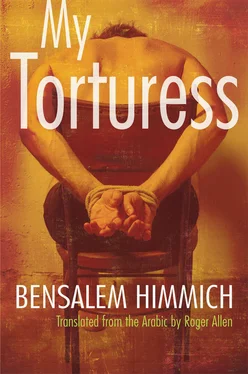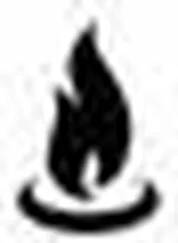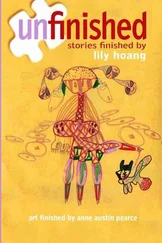“As night was falling, I got up and went to the house. I found my mother sitting in the dim light of a gas-burner; she had her head in her hands and looked sad and distracted. I sat down by her side to offer her some comfort and consolation. As usual, I listened as she said nice things about me, how she prayed that God would grant me success and that what would be would be. I did not interrupt this flow of prayers except to mutter an occasional ‘O Lord!’ or ‘From your lips to God’s ears, dear mother!’
“I thought this was the appropriate moment, so I launched into a speech in which I tried to convince her that I was leaving but would still be in Morocco, not in some Christian country or some vacant region in the world. I wanted to make sure she realized that I would always be at her side in times of trouble and hardship or whenever her husband turned unruly and violent.
“It was a dawn in fall when I left; it felt exactly like summer. Both my mother and myself were totally grief-stricken. She wept uncontrollably and kept praying that I would be successful and my path would remain free of evils and the temptations of prostitutes and other anathemas. Before leaving for the bus station with my only suitcase, I told her husband that, if he did not behave in a God-fearing manner towards my mother, I would cut off his nose and break his bones. ‘You can go to hell,’ I heard him brag. ‘The devil take you!’”
At this point I sensed that my neighbors, even those right next door, were quiet; I could even hear some snoring. I waited for a while to see whether they wanted to hear any more, but everyone was tired, it seems, and there were no requests. With that in mind, I went on recording my report:
My new residence was in Oujda, capital of Eastern Morocco, close to the border with Algeria. It is where mountains, plains, and river valleys come together. It was the entry point used by the French colonial forces to arrive in Morocco. In older times it was often known as “the city of bewilderment.” I did not head there because I had a particular preference for it or was trying to glean some good luck from the fact that my ancestors had lived there. All I wanted was somewhere safe where I could find a job.
I was hoping that my only cousin on my mother’s side who lived there might offer me some help. Through his good offices, that is the way it turned out. He was an astute, proud, and generous man, mild-tempered, good company, and multi-talented. In his forties, he had already lost both his parents and was a self-made man. He may have been married before but had no children. He was forever concerned about the poor and indigent and offered them as much help as he could. He was always restless and traveled a lot.
When I arrived in town empty-handed, doing my best to keep my anxieties and sense of loss to myself, he gave me the warmest of welcomes. He provided me with a sense of security by installing me in his bookstore, which he had been on the point of shutting because of the failing economy and the small number of readers. He put me in charge and gave me a regular monthly salary.
I spent four years in Oujda, during which I enrolled at school and obtained my high school diploma; at university I obtained a BA in literature and another in Islamic studies. The reason for these successes of mine clearly goes back to my almost continuous obsession with reading and study, much aided by the amount of spare time I had in the bookstore with its supply of valuable sources and other texts I brought there either through purchase or exchange. Once my commerce in books began to be successful, I set up specific opening and closing times. That way I was able to devote my attention to serious customers, and then set about reading the books for myself. I often used to spend a good third of the night concentrating on my reading; the only thing to interrupt the process would be moments for reflection or the need to reset the traps for the rats, who chewed on the paper or were merely scavenging.
Whenever possible, I used to visit my mother in the desert near Ouad-Zem and see how things were going for her. She would always reassure me and try to avoid mentioning her husband, whose health was rapidly declining. He used his illness as an excuse to lie on his side all the time and cling to her for all he was worth. At the end of every visit she used to load me down with food, accompanied by copious prayers and kisses. That’s the way things stayed until I recently received news of his death after the funeral and burial. When I visited her before I was arrested, I found her restored to her old self, as though she had at last managed to relieve herself of a painfully heavy burden. She was managing the plot of land that she had inherited, and had no need either to sell or abandon it. After that we lost contact with each other since, entirely against my will, I have found myself as a guest in your midst, a prisoner with no trial or fixed charge against me duly backed up by factual evidence and motive.
This and only this is what comes to my mind. Anything else may belong to that region where the devil of human kind may wish to recall whatever it is. Farewell.
Folding up the sheets of paper, I hid them where the anticipated shower from the water hose could not get them wet. All that was in the expectation that the investigating judge — may God not show his face again! — would be asking for them. That done, I lay down and surrendered to a restless sleep, one without color or taste, one for whose visions and flashes I had no explanation — apart, that is, for the last one of all, in which my mother appeared to scold me for staying away for so long and losing touch with her.
“I haven’t had a single card from you,” was exactly what she said, “even though you may be in some remote corner of the globe. Just let me know for sure that the sea hasn’t swallowed you up, as it seems to be doing with lots of young men these days.”
“Actually, Mother,” I responded sheepishly when I had woken up, “I have been swallowed up, but by a vast desert. I’m in a terrible, ghastly prison in some totally unknown location; the weather here is either hellish hot or freezing cold. No letters come in, and none go out. All you can do, Mother, is to abide in patience and pray for me — God alone has the power and might!”
6.In the Clutches of the Investigating Judge’s Secretary
I was woken up at heaven knows what hour by a gruff voice proclaiming that exercise was better than sleep. Before that, I had been involved in a dream set somewhere between Ouad-Zem and Oujda. The hero was my cousin, who kept asking for me and seemed really sad and worried by my extended absence. When I woke up, one of the guards was telling me to do some warm-up exercises in my cell — jumping jacks, hopping on one foot, push-ups, and shadow boxing. I was deeply involved in the last activity when the guard told me to stop, but I refused on the grounds that I had not yet administered the knock-out punch to my adversary; in my imagination that person was the investigating judge and no one else. The guard rushed over and frog-marched me to the prison courtyard, where group exercises were being conducted under the general slogan “ mens sana in corpore sano .”
Once in the prison courtyard, most of the inmates doing exercise were simply walking around the perimeter one behind the other. Each person had to be two or more meters apart from others; all talk was forbidden, even the vaguest whispers or gestures. It was only a very small minority who decided to run; they may have been either newcomers or else those who had yet to be subjected to torture.
Just before the exercise period came to an end, I spotted my former cell mate, the one called Ilyas Bu Shama, in the distance. Quite spontaneously, I went over to ask him how he was and to check on his health. One of the guards stood in my way and threatened me with the dungeon if I did such a thing again. I went back to my place, hoping that there would be no repercussions.
Читать дальше












